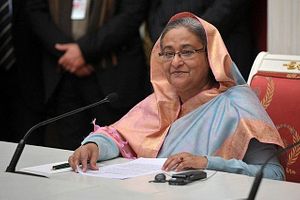On March 26, Bangladeshis will celebrate their 46th year as an independent nation. The story of Bangladesh’s independence should sound familiar to Americans: A people governed from afar by brothers with whom they had grown estranged; an economic engine whose cries for equal representation fell on deaf ears. West Pakistan tried to crush East Pakistan’s hopes with violence and martial law, only to ignite the flame of liberty that guided them to freedom. Like the United States, Bangladesh’s founders sought to leave behind the toxic divisions of the past, and established their new country on “the high ideals of nationalism, socialism, democracy, and secularism.” After nearly 50 years, however, these ideals are at risk, and none more so than secularism.
Unlike Pakistan, which has tried to manufacture a common religious nationalism to replace linguistic and cultural diversity, Bangladesh enjoys a syncretic culture developed over millennia. In 1971, this indigenous culture of tolerance and inclusiveness became the target of the Pakistani Army and their Jamaat-e-Islami militias, who attempted to smear Bengalis as “anti-Islam” for seeking independence. Sadly, while Bangladesh won its independence in 1971, the war on Bengali culture continues.
Over time, secularism in Bangladesh has been slowly eroded due to a dangerous combination of political expediency and foreign influence. Military dictators courted Islamist groups in order to bolster their legitimacy, and Islamic states like Saudi Arabia have poured money into building fundamentalist mosques and madrassas. Pakistan’s Inter-Services Intelligence agency (ISI) has secretly funneled funds to support Islamist politicians and their allies. These investments in undermining Bangladeshi secularism appear to be paying off.
While the Awami League, Bangladesh’s current governing party, is avowedly secular, many Bangladeshis have expressed concern about whether recent government decisions are eroding the country’s inclusive foundation. A recent decision to incorporate changes to textbooks that appear to Islamize the public school curriculum alarmed intellectuals. Others point to the weakening of a long-standing law against child marriage which also received praise from Islamists – though this may have been driven more by the country’s inadequate economic and social welfare institutions than an effort to appease religious groups.
Observers have warned that “a dark political calculation” may be behind these decisions, that the government may be trying to conquer the Islamist threat by dividing its political loyalties. It is possible that the government of Bangladesh, as part of its efforts to curb militancy, is trying to tame extremist groups by pursuing concessions that make it harder to frame the government as somehow “anti-Islam,” a charge used by political opponents.
Recent statements by Prime Minister Sheikh Hasina add to concerns that the government of Bangladesh may be pursuing a dangerous strategy of attempting to defuse Islamist extremism by making concessions to Islamists. At the National Imam Conference in Dhaka earlier this year, Hasina reiterated calls on Muslim scholars to help guide people away from militancy and terrorism – an important message. She then, however, went on to assure clerics that her government is working to spread Islam in Bangladesh, including by increasing the number of mosques and Islamic cultural centers funded by Saudi Arabia.
State support, even tacit, for religious extremists is a proven failure in combating militancy and preserving religious liberty. In Pakistan, the vision of founding father Muhammad Ali Jinnah in which “Hindus would cease to be Hindus, and Muslims would cease to be Muslims, not in the religious sense, because that is the personal faith of each individual, but in the political sense as citizens of the State,” has all but vanished. Egypt has been a case study in the dangers of appeasing Islamists: Secular President Abdel Fattah al-Sisi has tried to use religion to defang Islamist opponents, only to see the strategy breathe new life into the Muslim Brotherhood. Most recently, Turkey has experienced a growing threat from religious extremists following a weakening of secular reforms in the country under President Tayyip Erdogan.
Husain Haqqani, director for South and Central Asia at the Hudson Institute and an authority on Islamism, explained the futility of trying to moderate Islamists by encouraging their participation in politics in a 2013 article for The Journal of Democracy:
“Some Western commentators have expressed the hope that Islamists might be content with dispensing patronage to their supporters and providing relatively just and decent governance. But this optimism is misplaced. It is unlikely that Islamists can avoid pressure from their ideological core to push for a greater role for Islam in the public sphere.”
Groups like Hefazat-e-Islam and Jamaat-e-Islami are founded on the expressed goal of replacing secular democracy with an Islamist theocracy. The misguided belief that these organizations can “moderate” if given more power ignores this crucial fact.
Bangladesh is already over 86 percent Muslim, with the number of non-Muslims shrinking as Hindus leave out of concern for their safety. It is unclear whether the government realizes the inherent danger involved in its efforts to pacify Islamists. Combating militancy by empowering Islamist groups and endorsing their proselytization, even passively, risks making the country’s problems with religious extremism worse, not better.
Political strategies that involve appeasing Islamist groups have proven failures where they have been tried elsewhere, and Bangladesh risks further weakening its already vulnerable secular identity by pursuing similar efforts. As Bangladesh’s Independence Day approaches, the country’s political leaders should reflect on the secular principles on which the country was founded, and abandon misguided strategies that threaten to normalize the very religious extremism they seek to defeat.
Seth Oldmixon is president of Oldmixon Group, a public affairs firm, and the founder of Liberty South Asia, a privately funded campaign dedicated to religious freedom and political pluralism in South Asia.
































